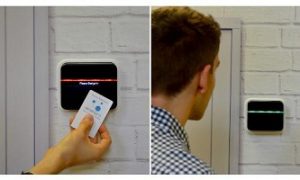
Alcatraz AI, a startup working on facial authentication frictionless access control for the enterprise, has announced the launch of a full stack platform with custom hardware on the edge, software on-premises and in the Cloud. The company, leverages facial recognition, 3D sensing and machine learning to enable highly secure and multiperson frictionless access control.
The company’s first product is described as a tightly integrated hardware and software solution that authenticates employees’ faces in-the-flow, always checking for tailgaters. A patented built-in self-enrollment using AI does not require any administration or employee action, as it associates faces and badges over time, switching to face-only mode autonomously as soon as the employee is seen enough times.
Alcatraz says it has raised close to $6 million in funding from multiple investors, including Hardware Club; Ray Stata, co-founder and chairman of Analog Devices; JCI Ventures, the corporate venture arm of Johnson Controls; Ruvento Ventures; and Hemi Ventures.
Currently, the only way to enhance physical security at access control points is by adding biometric readers or guards that manually check employees in real-time, the company explains. Existing technologies such as fingerprint and iris scanners have low false acceptance rates but increase friction, need employee interaction and are not suitable for mass deployments. They are also only appropriate for environments where a limited number of people need access.
Facial recognition access control has the potential to be frictionless for deployment in many environments, but past limitations have included ease of spoofing, range and speed, according to the announcement. The company bills its product as offering an industry-first, instant one-factor authentication for multi-person in-the-flow sensing. It uses multiple built-in cameras for real-time 3D facial mapping and NVIDIA GPU-powered deep neural networks. This is said to allow for multi-person facial authentication as well as the automatic enrollment of individuals using current access control methods, such as badging.
Alcatraz can deploy at locations where thousands of employees require access to buildings, without burdening HR or IT with the task of enrolling employees into a new security system, the company states. Additional features of the platform include tailgate detection, real-time notifications with video and access control analytics. The platform is said to enable efficient and guardless entry flow and is scalable, fast to deploy, and easily integrates with existing access control systems.
More advanced access control technology was not able to solve this as fingerprint and iris scanners — although providing more security than badges — require employee interaction, increasing friction while not solving tailgating. Deploying such biometric readers in high traffic locations is also not possible, as enrolling thousands of employees means calling them back to the HR office for a new scan — a logistics nightmare, he says.











